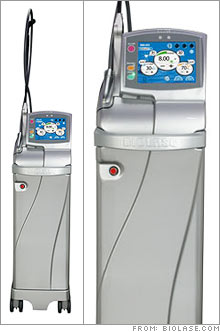Afraid of the dentist's drill? Try a laserDentists are slow to take on laser-water drills, so Biolase woos them with flat-screen TVs.NEW YORK (CNNMoney.com) -- Laser dentistry - in which a laser beam mixed with water is used to vaporize cavities, as well as unwanted gum tissue and enamel - is supposed to be the wave of the future. But dentists are slow to take on the new laser-water drill, which is produced by market leader Biolase (up $0.06 to $8.56, Charts) and other companies specializing in laser technology.
Some dentists are resistant to change, while others just have bad memories about the older laser drills. Older models were less popular with dentists because they were difficult to use and therefore not as safe as the new laser-water drills. "There is a number of dentists who have a dated concept of what laser dentistry is, and that gives Biolase a challenge of reaching these dentists, [to teach them] how far advanced Biolase really is," said Biolase chief executive Jeffrey Jones. Biolase is wooing dentists with the promise that its HydroPhotonics technology causes no pain and therefore requires no anesthetic. Also, to drum up business for its $85,000 Waterlase drill, Biolase and its distributor, Sullivan-Schein Dental, offered a holiday sales promotion that included a $5,000 discount plus a 50-inch plasma TV and a $5,000 Sullivan-Schein merchandise gift certificate. This is cause for concern, according to a Dec. 18 published note by Alexander Arrow of Lazard Capital Markets: "Because giveaways of this kind are typically not necessary to sell medical devices for which demand is brisk, we are concerned that the need to run such a promotion is a sign that, two months into the new distributor relationship, the new distributor is encountering lighter-than-expected demand." Most dentists aren't biting at these expensive, newfangled laser drills, even though they've been approved by the Food and Drug Administration since 1998. "Market penetration is relatively low," said Gail Siminovsky, executive director of the Academy of Laser Dentistry, who said that the growth in laser dentistry has flattened after seizing some five to eight percent of the market in the first five years of its rollout. "The nature of the [dentistry] profession is that it's conservative and resistant to change. It's going to be a while before every dentist office has a laser." Analysts expect Biolase sales for 2006 to total $70 million. That's not a big number, but it represents 70 percent of the market for laser dentistry. Biolase, based in Irvine, Calif., is known as an aggressive marketer - witness the free flat-screen TVs - which has helped it dominate competitors like Sirona Dental Systems (up $0.47 to $39.32, Charts), Syneron Medical (up $1.14 to $27.06, Charts), Lumenis and Hoya ConBio. "To own 70 percent of any market, no matter how small it is, is a good thing," said Jose Haresco, analyst for Merriman Curhan Ford. Still, Haresco said that as little as 3 percent of all dentists use laser drills. But with more than 100,000 dentists nationwide, the market potential for new dentistry technology is massive. Analysts, including Arrow, are bullish on Biolase going forward, even if the Waterlase drill system isn't an easy sell. The company lost money last year, with an estimated earnings per share loss of 24 cents in 2006, but 2007 could bring it into the black. Arnold Ursaner of CJS Securities projects a 2007 EPS profit of 4 cents, while Arrow of Lazard projects 14 cents and Dalton Chandler of Needham forecasts 29 cents. The stock price - which closed at $8.50 a share on Jan. 3 - is expected to increase by more than one-third over the next year. Analysts have set 12-month targets of $12 or $13 per share. The fact is that laser-water based dentistry is superior to traditional high-speed drills, according to analysts. Chandler of Needham said they're also superior to the older laser drills that didn't use water, which were more difficult to operate and, if improperly used, could accidentally cut enamel and cause pain for the patient. "Really a big part of Biolase's challenge is to convince dentists that their laser drill is different from any laser they might have used or heard about in the past," said Chandler, adding that the bad association is part of the reason why dentists are slow to take on the new technology. But Chandler and other analysts believe it's only a matter of time before the laser-water drill takes over mainstream dentistry. "If you've ever had the experience of sitting in a dentist chair and using a high-speed drill and then had the experience of using a laser drill, you'll never go back to a dentist that uses a high-speed drill," said Chandler. "I think it's inevitable that lasers will take over from the high-speed drill." Making an impression on the next generation of patients could be the key, according to Biolase CEO Jones, who said that he's used laser dentistry on his own son. "It can change how a child today grows up thinking about dentistry, where they don't have the fear of dentistry," said Jones. "It literally changes dentistry, but it takes the dental community a while to absorb it." The analysts quoted here do not own shares of stock in the companies they discussed, though Needham, Merriman, CJS and Lazard make a market with Biolase. |
|

